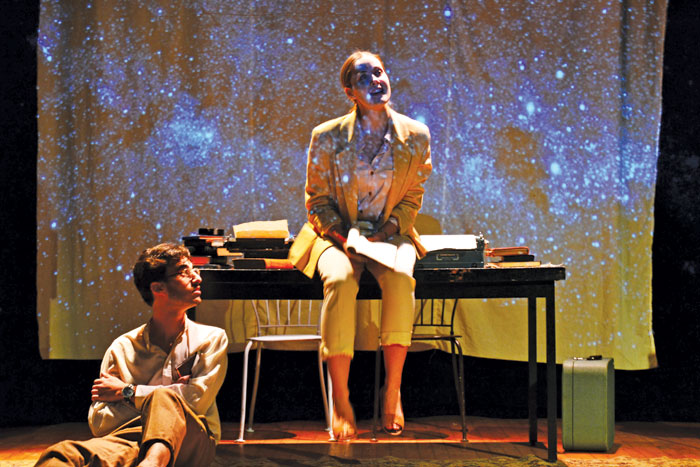Hemmingway once wrote, “Writing, at its best, is a lonely life.” The lives of poets Elizabeth Bishop and Robert Lowell, as portrayed in Tuesday Night Café’s production of Dear Elizabeth, put that idea into practice. With a couple of brief exceptions, the sole pair of actors in the play are never actually together, talking to each other through the letters they write through their lifelong friendship.
Dear Elizabeth, written by Sarah Ruhl and directed by Marina Miller, tracks Bishop and Lowell’s relationship, spanning from the late 1940s to the ’70s. Told entirely through letters cut up and pieced back together by Ruhl, the actors spend their time sharing anecdotes about their lives, critiquing each other’s poems, and name-dropping every notable writer from the 20th century. While there’s no conventional narrative in the play, the content of the letters are meant to show the progression of their relationship—from almost-strangers to almost-lovers.
Ostensibly, the play is about weighty topics such as love, creativity, mental illness, and loneliness. However, it never really offers any form of insight into these issues—we sporadically see how these things affect each character, but there’s never a sense that it’s trying to reach further than the realm of cliché. For instance, Lowell (Max Katz) and Bishop’s (Julia Borsellino) mutual alcoholism gets distilled into him drinking and dancing too much and then passing out, and her taking a swig from a bottle of rubbing alcohol and throwing up. Other than that, it seems to have no effect on either of their lives. This lack of engagement may come from the limits of the source material—the Robert and Elizabeth of the letters are probably not very close to who they actually were, but instead, the version of themselves that they tried to show to the other person.
Playing Bishop, Borsellino makes the entire production worthwhile. A talented actor can run the gamut of emotions from happy to depressed to longing to energetic to wistful, but a truly gifted performer can express them all at once. She manages to give meaningful insight into Bishop’s inner life with every sidelong glance and weary stare. Every gesture has a hidden meaning that is simultaneously obfuscated by Bishop’s uneasy personality and illuminated by Borsellino’s performance. Every mannerism is a pixel in the picture of a fully realized person. When she breaks into tears over the death of a lover, it doesn’t seemed forced or actorly, but a genuine reaction to loss. It would have been very easy to go too far in either direction with the moment, but she plays it with such a perfect and precise level of disquiet that truly elevates the material.
Unfortunately, Katz’s portrayal of Lowell falls short of his epistolarian counterpart. In a play with so few characters, the success of the production is greatly influenced by the success of any individual performance, and Katz struggles through the part at times. Part of this certainly comes from the fact that Robert never gets the chance to reveal his true self through the letters in the same way Elizabeth does, and it should be noted that the performance comes alive at the moment when Lowell reads from one of his poems. But for the rest of the performance, I couldn’t get over the impression that his performance was mainly inspired by cigarette commercials from the 1950s, both in cadence and mannerisms.
The technical aspects of the production were uniformly fantastic. The set has a great sense of symmetry to it, with each half of the stage devoted to each character, and a desk with two typewriters in the middle that blurs the barrier between the two worlds. Bishop and Lowell’s relationship spanned three decades and two continents, and this production uses a number of stagecraft tricks to bridge that gap. Projections onto the back curtain of the stage show handy intertitles of the date, a night sky, and a beach where Bishop and Lowell grew closer together throughout the course of the play. The stage lights cut in and out to represent the passage of time. Costumes change to reflect the evolution of style over the years. With all of this, it’s still fairly easy to be confused on the time or the place, but the lack of firm grounding allows the audience to focus more on the content of the characters’ communication than the context.
Dear Elizabeth runs from Wednesday, Feb. 18 to Saturday, Feb. 21 at the TNC theatre (Morrice Hall). Tickets are $6 for students and $10 for non-students.








